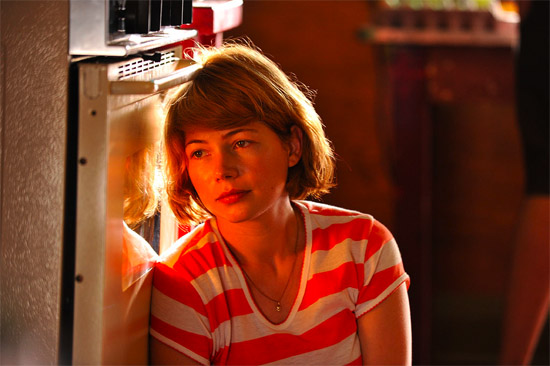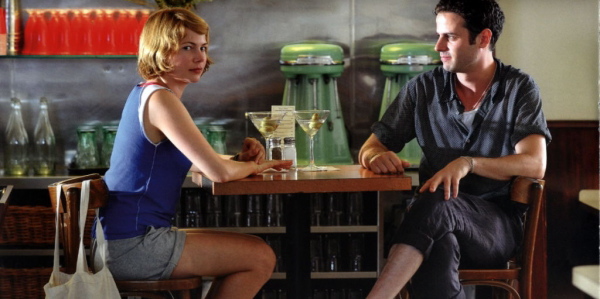|
Margot (Michelle Williams) is a freelance
writer who meets Daniel (Luke Kirby). There is a quiet attraction
between the
two of them as they travel home together. Yet Margot reveals that she
is
actually married to Lou (Seth Rogen), an author of cookbooks. Daniel
also
surprises Margot when he announces that he is actually her neighbour,
living
right across the street from her and working as an artist and a
rickshaw
driver. When she is not spending time with Lou's sister Geraldine
(Sarah
Silverman), Margot finds herself caught between both Daniel and Lou but
in a
very subtle way. Her relationship with Lou veers between affection and
boredom
and when she meets up with Daniel their experiences are entirely
passive.
Neither she nor Daniel can act on their feelings, even though the
admiration
between the two of them remains.

Sarah Polley is the Canadian writer-director
of Away from Her (2006) and her new
film is strange, moving and very funny. I love its uniqueness, in
particular
its view of love as an intoxicating and dislocating experience. Through
Polley's eyes as a director and through her talented cast, love has the
ability
to disorientate one's personal identity and even their sense of
geography. It
can inspire uniqueness, joy, addiction but also the fear of isolation
too. The
screenplay and the design of the film find clever and interesting ways
of
expressing this. A lot of the dialogue, ranging from staccato speech
patterns to
long monologues, is cryptic and bordering on self-conscious. Yet
critically, it
always has a purpose towards addressing a theme. "I'm scared of
connections...In airports," Margot says. She's reflecting on being
trapped
in an empty void in her life, loneliness, in the absence of a
relationship. Mirroring
Margot needs to fulfil her life is Geraldine, who is a recovering
alcoholic. The
addictive habits of both women, drunkenness and love, are viewed
collectively
because they free them from themselves. Consider a moment where Margot
is on a
spinning fun ride with Daniel. In one of the most joyous scenes I can
remember,
flashing lights, booming music, courtesy of the song "Video killed the
Radio Star," and dizzying camerawork takeover Margot's life. Yet this
moment of bliss is disrupted as the lights come back on to reveal a
sad, grey
place and a maintenance guy opening the doors of the ride. Is there a
more
hysterically funny or ironic vision of someone plummeting back to
reality than
that? It's a wonderful scene because it's a metaphor for Margot's view
of disorientated
love. For a brief period, she's freely transported, without having to
think
about whom is she or where she is going. It perfectly asserts the
film's
relationship between intoxication and infatuation.

One of the other unique ways that Margot's
idealism for new love is expressed is through the film's sumptuous
visual
design. The look of this film is gorgeous. It's somewhere between an
expensive
postcard and a fairytale. Smartly, its picturesque qualities are never
incidental.
Polley's selection of primary colours deliberately illuminates Margot's
moods
and experiences. Look at the textures of her yellow clothes, the red
paint on
the rickshaw or the blue water in the pool. These are all deliberately
lit with
bright tones and high saturation as a means of showing how happiness is
bred
from what appears to be organic, new
or free. As Margot's life becomes gloomier, like after a verbal
argument with
Lou, Polley selective resorts to darker shadowing to illuminate
Margot's
unhappiness in her life. Consider how dully lit a restaurant scene is
when Lou
and Margot sit opposite one another with nothing to talk about. One of
the
other successes of the film is that Polley's script avoids the pitfalls
normally
associated with Hollywood love triangles. The characters here aren't
judged
with simplicity. Lou, a restrained and sometimes very funny performance
by Seth
Rogen, is not demonised. He's just a bloke who knows what he is good at
and
doesn't feel the need to change his life or make any extra effort. He's
comfortable with cooking and writing about just chicken and that's how
he views
the rest of his life too. In the restaurant scene, for example, he
can't see
the point of talking for the sake of talking. In a lesser film you
could
imagine a cliché scene of him ready to stand over Daniel. Yet the
gentility of
Polley's direction, deftly focusing on aching facial expressions,
instead of
huge verbal stoushes, makes the unspoken tension of the love triangle
more
intense. The unpredictability of the film's trajectory too, and there
are some
surprises, means that its resolutions are real and occasionally moving.

As a character Daniel is slightly more
elusive than Lou but no less charismatic. He's more in love with Margot
as
fantasy because he talks in possibilities rather than asserting himself
through
his actions. His monologue where he expresses everything he would do
with
Margot is written in such a sweet way that we can't grow to dislike him
because
his desires seem so earnest and true. In between both blokes is Margot,
beautifully played by Williams. Both the character and the performance
are
equally fascinating. Williams is so convincing in creating a visible
degree of
conflict in her all characters and here Margot is distracted and
fidgety in
such a way that we understand how desperately she is trying to avoid
her true feelings.
There are very strange details to Margot too, like the little verbal
games she
plays with Lou and the childlike noises they make together. Their
banter, and a
hilarious pool scene, constructs an image of a woman who finds growing
up to be
so frightening that she must rely on fleeting relationships as a way of
providing uniqueness and direction in her life. It's such a strange
little
movie but beautifully acted and undeniably fascinating. Position
yourself as
Margot: strap yourself in for the ride and don't wait for the lights to
come
up.
|